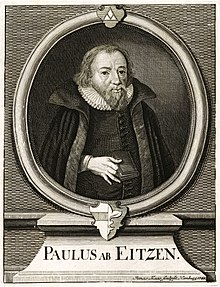Paul von Eitzen

Paul von Eitzen (born January 25, 1521 in Hamburg , † February 25, 1598 in Schleswig ) was a Lutheran theologian and reformer.
Live and act
Growing up in Hamburg as the son of wealthy parents, von Eitzen attended the Johanneum's school for scholars . In 1538 he went to Wittenberg , where he joined Philipp Melanchthon during his studies , to whom he remained loyal until his death. On his recommendation, he became rector in Cölln and was appointed to the University of Rostock in 1547 to teach didactics.
In 1548 he went to the cathedral of his hometown as lector secundarius and pastor . Johannes Aepinus ordained him and introduced him to his new office. In the dispute over Christ's descent into hell , he was on Aepinus' side. After Aepinus' death in 1553, the superintendent's position remained vacant for two years, until the council decided in 1555 to elect von Eitzen. In addition to the office of superintendent, he also took over the chairmanship of the school system as Lector primarius in accordance with church regulations . Since the church order required a doctorate for this, he went back to Wittenberg and acquired the academic degree of Doctor of Theology in 1556.
In the theological disputes of the next few years he took a moderate direction. In order to ensure the unity of teaching, he had all Hamburg pastors sign five confessional letters, including the confession of the preachers in Hamburg of the venerable sacrament, presumably written by him . Even so, he did not achieve peace. Therefore, in 1562, he accepted the call of Duke Adolf I of Schleswig-Holstein-Gottorf as court preacher at Gottorf Castle and superintendent of his partial duchy. Before that, he had already taken part in the Naumburg Fürstentag and the conference over the dispute over Albert Ritzaeus Hardenberg on behalf of the Duke in 1561 . 1564 The Duke and the Danish king named him Frederick II. For general superintendent for the whole of Schleswig-Holstein . In the diocese of Schleswig he campaigned for the establishment of a school for scholars at Schleswig Cathedral , which, however, only lasted until Duke Adolf's death.
Although von Eitzen was a Gnesiolutheran , he took his point of view towards Melanchthon mildly and stayed largely out of theological disputes, as they were a source of ruin for him. However, he was an opponent of Jakob Andreae and his efforts to introduce the formula of concord . For this reason, the concord formula and the concord book were not introduced in Schleswig-Holstein, especially since the Danish king rejected them. Von Eitzen became known through the Gottorp oath of ordination of 1574. The preachers were committed to the Confessio Augustana , its Apology, Martin Luther's Catechism and the Schmalkaldic Articles .
An anonymous print published in 1602, i.e. after his death, claims that Paul von Eitzen is said to have seen and spoken to the "Eternal Jew" Ahasver in 1542 (according to another version, 1547) in Hamburg .
Others
In his novel Ahasver , Stefan Heym sets a literary monument to Paulus von Eitzen and his alleged encounter with the "Eternal Jew" . In it, Eitzen is described as a perky and career-addicted, bigoted and ambitious-stupid character, whom the devil takes at the end of the book in the presence of Ahasver.
Works
For a complete overview, see the list of prints from the 16th century published in the German-speaking area (VD 16)
- Ethicae doctrinae libri II . 1572
- Catechismi exam . 1583
- Evangelical postil . 1591.
literature
- Jürgen Beyer: Jürgen and the Eternal Jew. A living saint becomes immortal . In: Arv. Nordic Yearbook of Folklore 64 (2008), pp. 125-140
- Ernst Feddersen: Paul von Eitzen, the first General Superintendent in Schleswig. Mühlau, Kiel 1919 (pictures from Schleswig-Holstein church history; 1)
- Johannes Schilling : Paul von Eitzen - a church father of Schleswig-Holstein . In: Marion Bejschowetz-Iserholt, Reimer Witt (ed.): Church life in Schleswig-Holstein in the 17th century. Lectures on an exhibition in the Schleswig-Holstein State Archives. (Publications of the Schleswig-Holstein State Archives 78) Schleswig 2003, pp. 41–58
- Carl Bertheau : Eitzen, Paul von . In: Allgemeine Deutsche Biographie (ADB). Volume 6, Duncker & Humblot, Leipzig 1877, pp. 481-485.
- Hermann Schüssler: von Eitzen, Paul. In: New German Biography (NDB). Volume 4, Duncker & Humblot, Berlin 1959, ISBN 3-428-00185-0 , p. 426 f. ( Digitized version ).
- Eitzen, Paul. In: Johann Heinrich Zedler : Large complete universal lexicon of all sciences and arts . Volume 8, Leipzig 1734, column 657.
- Friedrich Wilhelm Bautz : Eitzen, Paul von. In: Biographisch-Bibliographisches Kirchenlexikon (BBKL). Volume 1, Bautz, Hamm 1975. 2nd, unchanged edition Hamm 1990, ISBN 3-88309-013-1 , Sp. 1483-1484.
| predecessor | Office | successor |
|---|---|---|
| The diocese administrator, Adolf I , who was not ecclesiastically immigrated , was assigned a theologian. |
General superintendent of Schleswig's Gottorf share from 1562 already superintendent of Schleswig (gottorf. Ant.) 1564 - 1593 |
Jacob Fabricius the Elder |
|
Volquard Jonas is the title of general provost |
General provost of Holstein's Gottorf share 1564 - 1593 |
Jacob Fabricius the Elder |
Remarks
- ↑ See also the entries by Paul von Eitzen in the Rostock matriculation portal
- ↑ Johann Heinrich Bernhard Lübkert, attempt a church statistics Holstein , Glückstadt: Johann Wilhelm Augustin, 1837 , p 56th
| personal data | |
|---|---|
| SURNAME | Eitzen, Paul von |
| BRIEF DESCRIPTION | Theologian and reformer |
| DATE OF BIRTH | January 25, 1521 |
| PLACE OF BIRTH | Hamburg |
| DATE OF DEATH | February 25, 1598 |
| Place of death | Schleswig |